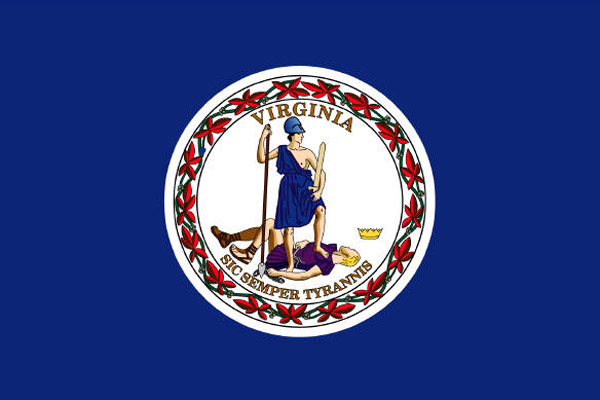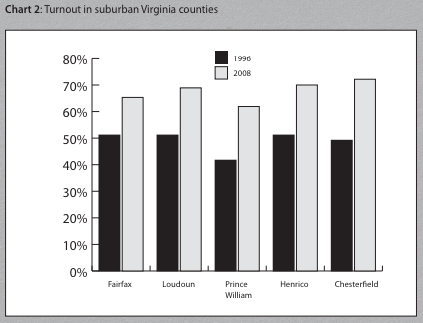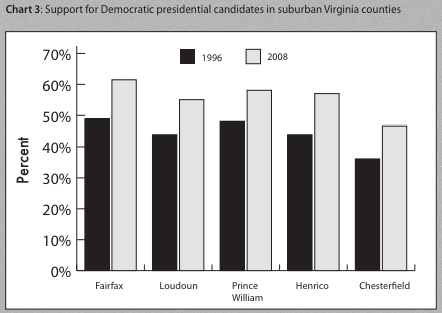
My home state, once part of the Confederacy, has a well-earned reputation as a politically conservative one: before Obama's win in 2008, it went Republican in ten straight presidental elections, i.e. basically every one since the South went solidly Republican. At the gubernatorial level it swings back and forth, but within a distinct range, from centrist Democrats (Warner, Kaine) to conservative Republicans (Gilmore, Allen, McDonnell), aided by the fact that governors can't serve consecutive terms.
Doug Wilder, winner of the first big race I remember, was America's first black governor and presaged what was to come in Virginia. Wilder was an excellent pol, forcing Marshall Coleman (who was not) into an awkward dance between the conservative wing of his party, which didn't like him but made up a crucial percentage of his likely voters, and Reaganish Democrats and centrist Republicans who could make the difference in the election:
Said Mark Rozell, a political scientist at Mary Washington College in Fredricksburg, Va.: "Coleman couldn`t define Wilder, couldn`t connect him with the Jesse Jackson wing of his party. He let Wilder set the agenda, and it was Coleman who had to make the case for change."
[snip]
"Coleman had to go after the hard-line ideological types who vote in primaries. He ran hard and he won, but he was staking out positions with movement conservatives and evangelical Christians.
"He may still win this race, but Doug Wilder is going to have to hand it over to him."
Sound familiar? Wilder beat Coleman by half a percent, and again in a recount.
George Allen, aided by a tough-on-crime stance and being the namesake of the legendary Redskins (and Chicago Blitz) coach, succeeded Wilder. But the state has ever-so-slowly been moving blue in fits and starts. Why? Blame big government, among other things:
A population boom and its attendant cultural, economic and demographic changes, particularly since the 1990s, has transformed a state both parties had dismissed for decades as a Republican redoubt into a pivotal electoral battleground for the second presidential race in a row.
[snip]
Virginia's population grew by 13 percent from 2000 to 2010, from about 7 million people to 8 million people. Hispanic or Latino populations nearly doubled over the period. The Asian population grew by 69 percent, the white population by 7 percent and the black population by 12 percent, according to census data.
Urbanization created a demand among city and suburban dwellers for more government services such as roads, public safety and public schools, a liberalizing influence on an electorate growing rapidly in the Washington Beltway and Hampton Roads.
[snip]
Fairfax County, the state's most populous locality, has grown by 142 percent since 1960, from 455,000 people to 1.1 million. Its neighbor, bucolic Loudoun County, saw an eightfold increase, from 37,150 to 325,405 now, with three-fourths of it spiking in the last 20 years. Its rate of growth since 2000 was the fourth-fastest of any county in the nation.
"The center of energy in Virginia shifted increasingly to northern Virginia because of its population growth and its wealth," said Mark Rozell, a political science professor at George Mason University in Fairfax County. "Politically, this state is very different from what it was just a generation ago."
Two things happened. General trends towards urbanization led to massive population growth in the D.C. area. This was aided by a massive influx of money into the area, thanks in large part to the explosion of lobbying money and government contractors over the past couple decades; during the economic crisis, D.C. and its suburbs were practically the only major urban areas in the country to maintain and even increase housing values due to the demand for housing and the money available to secure it. Immigrants and not-Southerners followed. And it made a big difference in 2008 (PDF):


After Virginia came in last time, it was over.
Obama has been polling ahead in every reliable Virginia poll since the end of October; FiveThirtyEight has him at an 80 percent chance to win the Old Dominion. But that's where my gut comes in: northern Virginia, or NOVA to those of us from elsewhere who wish to distinguish it from actual-Virginia, has been sending some very conservative pols to state office. Bob McDonnell, the very conservative governor, took almost the whole state (though Creigh Deeds wasn't much competition); his even more conservative attorney general, Ken Cuccinelli, is a Fairfax resident who won by nearly as large a margin as McDonnell. The GOP controls both chambers of the state legislature, which has only happened twice since the Civil War.
Take the 10th District: it went substantially for Obama in 2008, but it's an R+2 district with a conservative rep. Or eastern Virginia's 4th district, R+4, which went heavy for Bush twice and has a Republican representative, but went for Obama by a hair in 2008. Can Obama maintain that kind of uphill momentum, four years later? That's why, despite the polling, I'm skeptical—and no matter what happens in Ohio, my eyes will be on the place I grew up.
Update: Thomas Edsall has much more on the state, its voting patterns, and its changing demographics.
Image: Wikimedia commons


